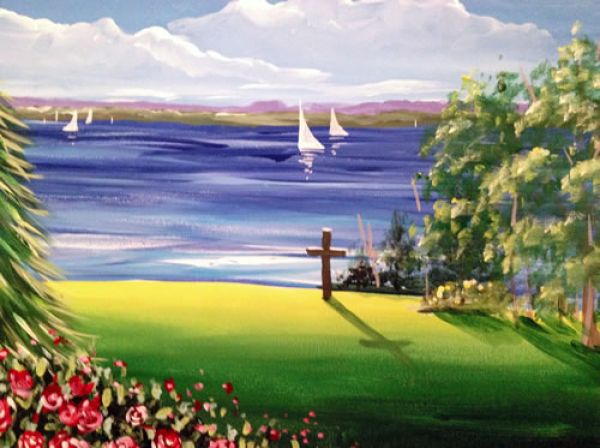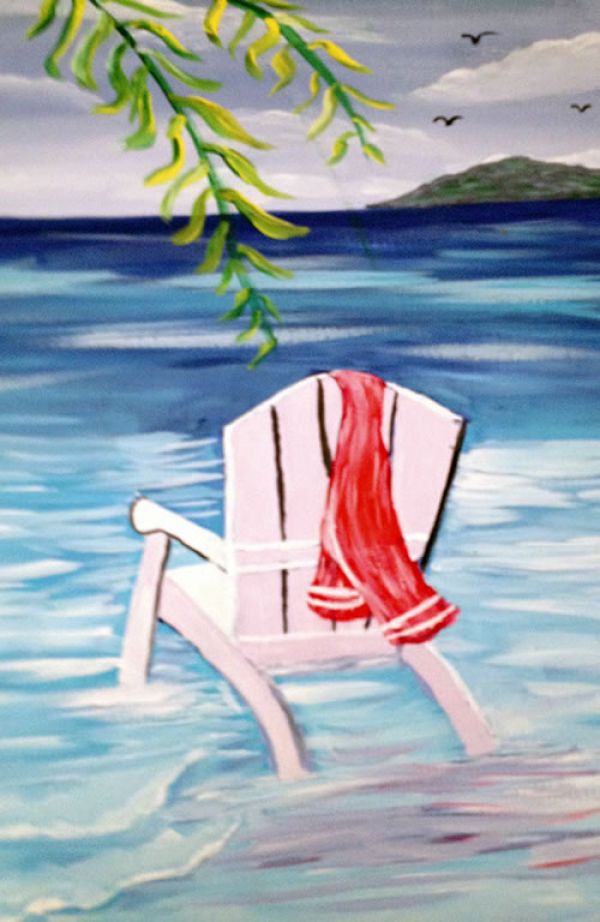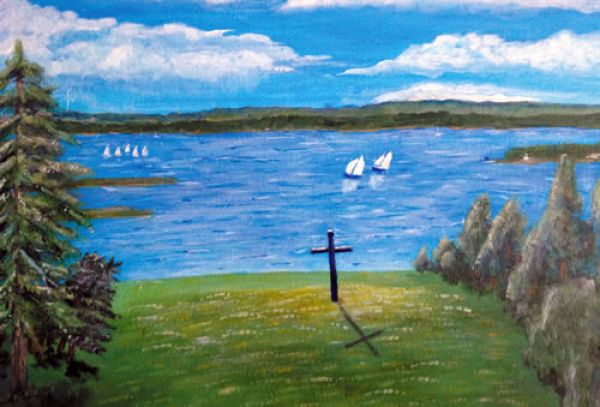
Waiting in Joyful Hope
The Columban Fathers' house in Bristol, Rhode Island, was a seminary for many years, but in the 1960's there were a few vacant priest rooms and a few retired Columbans moved in. Gradually the house changed from being a place where we trained our newest members to being a place where our oldest members live.

Those familiar with the Gospel of St. John will remember the scene of the resurrected Jesus encountering St. Peter. In verse 18, Jesus contrasts the freedom of youth with the restrictions of old age.
When they had finished breakfast, Jesus said to Simon Peter, "Simon son of John, do you love me more than these?" He said to him, "Yes, Lord; you know that I love you." Jesus said to him, "Feed my lambs." 16 A second time he said to him, "Simon son of John, do you love me?" He said to him, "Yes, Lord; you know that I love you." Jesus said to him, "Tend my sheep." 17 He said to him the third time, "Simon son of John, do you love me?" Peter felt hurt because he said to him the third time, "Do you love me?" And he said to him, "Lord, you know everything; you know that I love you." Jesus said to him, "Feed my sheep. 18 Very truly, I tell you, when you were younger, you used to fasten your own belt and to go wherever you wished. But when you grow old, you will stretch out your hands, and someone else will fasten a belt around you and take you where you do not wish to go." 19 (He said this to indicate the kind of death by which he would glorify God.) After this he said to him, "Follow me."
The triple questioning of Simon corresponds to his triple denial before the crucifixion. I keep coming back to this passage when I think about the lives of our senior Columban Fathers who are living in retirement at our house in Bristol. The median age for those in the house, myself included, is 83. Life as a missionary has a way of repeatedly asking of those of us who are trying to walk this path, "Do you really love the Lord?" and "Are you really doing a good job at feeding His lambs?"
At various times of the life cycle, the answers might be different. "Lord you know that I love you," some might go on to say, "Look at how I have traveled so many miles, learned to preach in a foreign language, learned to eat unusual foods. All this I accomplished when I was young."
The book of Ecclesiastes reminds us, "For everything there is a season, and a time for every matter under heaven: a time to be born, and a time to die; a time to plant, and a time to pluck up what is planted; a time to kill, and a time to heal; a time to break down, and a time to build up; a time to weep, and a time to laugh; a time to mourn, and a time to dance."
Times and seasons of our lives change. At another time, a time of mid-life crisis, the answer to Jesus questions might be, "There are times I am busy and stressed and I find myself doubting, but I am sticking with it, because I believe You called me to this life and You will show me the way."
Still another time, the missionary might think, "I have foregone the pleasures of home and family, but God and His people have been good to me."
By the time a priest is resident in a retirement home, most people would probably conclude he has things figured out, but there are still many challenges, both physical and spiritual. There is a famous saying, "Old age ain't no place for sissies." It is attributed to actress Bette Davis; but whoever first said it really did name an important reality. Everyone has a few aches and pains, and many have diminished sight, hearing and energy. But in the later part of life, the questions one faces can become temptations to despair. One veteran Columban described the experience in these words:
When we look back on the past all we usually see behind us is a cold and lonely field of stubble, and we think nothing is left of our life's work, forgetting all the while about the full granaries in which are stored up the harvest of our lives.
In addition to all that, most missionaries have led lives of action: miles driven, buildings built, sermons But a time of life arrives, for those lucky enough to live into their ninth decade, when even the most energized among us must needs begin to pull back from all the going and doing. Men who have tried to live their lives as "men for others" find themselves coping with bodies that demand more attention to themselves. Visits to the homes of the poor are replaced by visits to the podiatrist, the optometrist, the cardiologist, the dermatologist, and so on. The Columbans have put in place a wonderful staff here. Everyone, the maintenance man, the nurses, the housekeepers, cooks, office staff contribute to a caring atmosphere. I think our presence has a symbolic meaning. Just by being present we are saying to senior Columbans, "You have been playing an important part of the Columban story for years, now that you are in the position of dealing with physical limitations, we are not going to just leave you to your own devices."
Of course, there is a great variation in how our senior Columbans are doing at meeting all the challenges and appreciating the blessings of a long life. Despite saying that we are "waiting in joyful hope," many if not most of us do not like to dwell too much on end of life issues. Some have prepared well for the less pastorally active retired lifestyle and have adapted well. Others seem to have assumed that they could move from their eighth to their ninth decade of life without making any concessions to diminished ability to hear and see and move. For these, adjustment can be a test of their spiritual mettle.
I am continually finding I have things to learn from the residents at Bristol. Many of them are more disciplined than I about taking exercise and other steps to promote and preserve their health. As one would expect, they are faithful to religious practices like Mass and the divine office. I also hope that I am learning a few lessons about aging with wisdom and grace and peace that will stand me in good stead tomorrow or the next day or whenever my time comes.
Columban Fr. John Burger lives and works in Bristol, Rhode Island.
Active Aging
In more recent years the former Columban seminary in Bristol, Rhode Island, has been expanded and adapted into a residence for older, retired missionary priests. There are seats and grab bars in the showers, and most importantly an elevator. Presently there are twenty Columbans in residence and all have spent years somewhere on the overseas missions. They range in age from 67 to 93. At those ages nearly everyone has some physical limitations due to the effects of aging, but they also still have the ability to learn new things and acquire new skills.
Inspired by the Osher Life-long Learning Institute at the University of Rhode Island, we have begun our own in-house program similar to the one at the university, albeit on a much smaller scale. The purpose is to enhance the enjoyment, meaning and direction of the fathers' lives as well as promote health and well-being. The Columban program is called simply "Active Aging in Bristol" and consists of short-term learning modules of roughly eight weeks each.
This program provides our retired Columbans with opportunities for learning through programs that nourish the mind, body and spirit. Stimulating programs of this type have been proven to delay the progression of aging.
The first of these modules, choral singing, was begun in February 2014. Mrs. Sheila Schattle, a neighbor and music director at the Methodist Church in Portsmouth, Rhode Island, was engaged to lead the singing sessions over a nine week period. Over the last few years, we have located teachers locally and had short courses in quite a variety of other topics: acrylic painting, writing, Rhode Island history, watercolor painting, and seated tai-chi. We also have twice-a-week exercise classes with a trainer from a local fitness center. The trainer does an excellent job of gearing up or gearing down the exercises to match the abilities of those who participate.
We believe that participation with others and learning new things even as the priests age will not only make their lives more interesting, but also contribute to their physical well-being.
Photo Gallery:
All artwork in this article by Columban missionaries living in Bristol, R.I.










 The Columbans are a society of missionaries, including priests and lay people, who minister to people of various cultures as a way of witnessing to the universal love of God.
The Columbans are a society of missionaries, including priests and lay people, who minister to people of various cultures as a way of witnessing to the universal love of God.